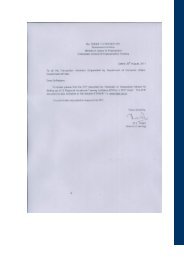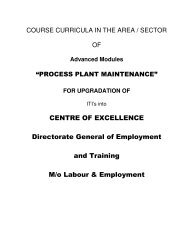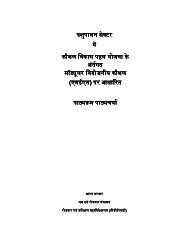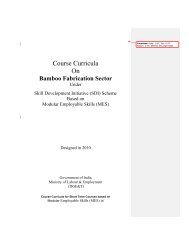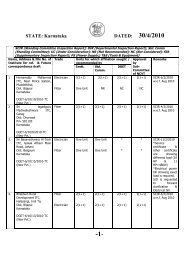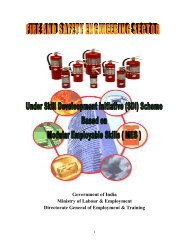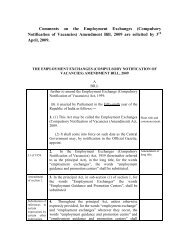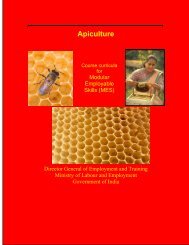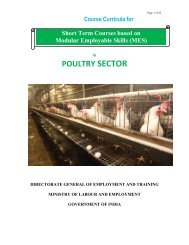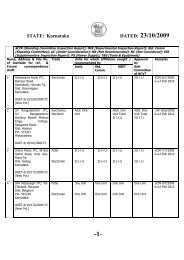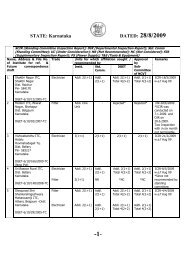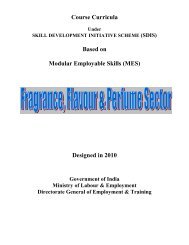Sericulture - Directorate General of Employment & Training
Sericulture - Directorate General of Employment & Training
Sericulture - Directorate General of Employment & Training
You also want an ePaper? Increase the reach of your titles
YUMPU automatically turns print PDFs into web optimized ePapers that Google loves.
Page 4 <strong>of</strong> 87<br />
Identification <strong>of</strong> „minimum skills set‟ which is sufficient to get an employment in the<br />
labour market.<br />
It allows skills up-gradation, multiskilling, multi entry and exit, vertical mobility and life<br />
long learning opportunities in a flexible manner.<br />
It also allows recognition <strong>of</strong> prior learning (certification <strong>of</strong> skills acquired informally)<br />
effectively.<br />
The modules in a sector when grouped together could lead to a qualification equivalent<br />
to National Trade Certificate or higher.<br />
Courses could be available from level 1 to level 4 in different vocations depending upon<br />
the need <strong>of</strong> the employer organizations.<br />
MES would benefit different target groups like :<br />
Workers in industry and farm houses seeking certification <strong>of</strong> their skills acquired<br />
informally.<br />
Workers seeking skill upgradation.<br />
Early school drop-outs and unemployed.<br />
Previously child labour and their family.<br />
1. c. Age <strong>of</strong> participants<br />
The minimum age limit for persons to take part in the scheme is 14 years but there is no upper<br />
age limit.<br />
1. d. Curriculum Development Process<br />
Following procedure is used for developing course curricula<br />
Identification <strong>of</strong> Employable Skills set in a Sector based on division <strong>of</strong> work in the labour<br />
market.<br />
Development <strong>of</strong> training modules corresponding to skills set identified so as to provide<br />
training for specific and fit for purpose<br />
Organization <strong>of</strong> modules in to a Course Matrix indicating vertical and horizontal<br />
mobility. The course matrix depicts pictorially relation among various modules, pre<br />
requisites for higher level modules and how one can progress from one level to another.<br />
Development <strong>of</strong> detailed curriculum and vetting by a trade committee and by the NCVT<br />
(Close involvement <strong>of</strong> employers organizations, state governments, experts, vocational<br />
training providers and other stake holders is ensured at each stages).<br />
1. e. Development <strong>of</strong> Core Competencies<br />
Possession <strong>of</strong> proper attitudes is one <strong>of</strong> the most important attribute <strong>of</strong> a competent<br />
person. Without proper attitudes, the performance <strong>of</strong> a person gets adversely affected.<br />
Hence, systematic efforts will be made to develop attitudes during the training<br />
programme.<br />
The trainees deal with men, materials and machines. They handle sophisticated tools and<br />
instruments. Positive attitudes have to be developed in the trainees by properly guiding<br />
them and setting up examples <strong>of</strong> good attitudes by demonstrated behaviours and by the<br />
environment provided during training.<br />
Some important core competencies to be developed are:<br />
1. Safety consciousness and safe working practices<br />
2. Care <strong>of</strong> equipment and tools



